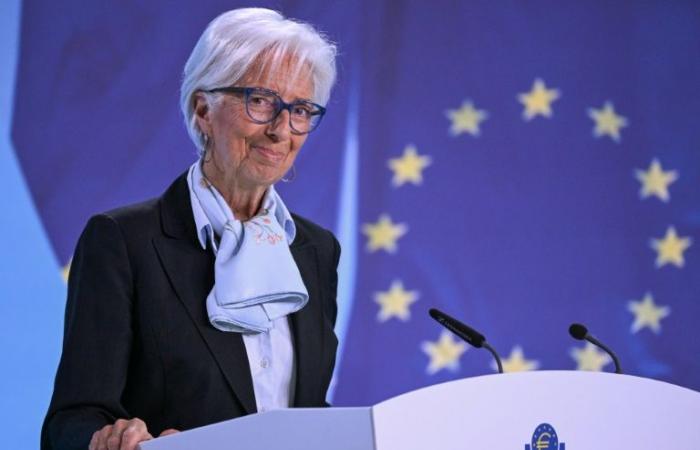Consumer price inflation slowed to 2.5% year-on-year, after 2.6% in May, in the 20 countries sharing the single currency, thanks to lower food and energy prices, according to figures published Tuesday by Eurostat.
Inflation is thus once again approaching the 2% target set by the European Central Bank (ECB), after having moved away from it the previous month.
Overall, consumer price inflation in the eurozone has more than quadrupled since the record 10.6% year-on-year hit in October 2022, amid a surge in energy prices amid the war in Ukraine.
But the road ahead looks set to be bumpy in the coming months: the indicator is expected to fluctuate before reaching the 2% target only in the second half of next year, according to forecasts from the ECB and the European Commission.
Enough to convince the monetary institution not to rush the current monetary easing, after an initial reduction in its key rates announced on June 6.
Economists now expect rates to be held steady at the next meeting of the ECB Governing Council on July 18, before perhaps a further cut on September 12.
“Stay vigilant”
“We will not rest until the game is won and inflation is back to 2%,” central bank President Christine Lagarde warned on Monday. “Our work is not done and we must remain vigilant,” she added.
“It already seemed unlikely that the ECB would cut interest rates at its July meeting and June’s inflation data will reinforce its policymakers’ very cautious approach,” commented Jack Allen-Reynolds for Capital Economics.
In June, the 0.1-point decline in inflation was in line with the forecasts of analysts at Factset and Bloomberg. But it comes after a 0.2-point increase the previous month.
Core inflation – that is, adjusted for volatile energy and food prices -, which is particularly closely scrutinized by financial markets and the ECB, remained stable over one month at 2.9%, according to the European statistics office. The consensus of analysts anticipated a slight decline to 2.8%.
The slight decline in inflation in June is explained by a slowdown in price increases of 0.1 points for both food (including alcohol and tobacco), to 2.5% over a year, and for energy, to 0.2%.
Inflation of service prices and that of industrial goods, on the other hand, remained stable compared to May at 4.1% and 0.7% respectively over one year.
“Headache”
“Despite the decline in headline inflation, the persistence of high services inflation will give the ECB headaches,” said Riccardo Marcelli Fabiani for Oxford Economics.
To stem inflation, the ECB had raised borrowing costs at an unprecedented pace from July 2022. On June 6, it began cutting its key interest rates, providing a small breath of fresh air to ease tensions on housing credit and corporate loans.
As a reference, the rate on deposits of 4%, its highest reached last September, was reduced to 3.75%.
Within the eurozone, the strongest price increase in June was recorded in Belgium (5.5%), where wages are indexed to inflation, ahead of Croatia and the Netherlands, both at 4.4% over a year.
Inflation reached 2.5% in both France and Germany, while Italy (0.9%) and Finland (0.6%) posted the lowest figures, according to harmonised Eurostat data.
Do you have a real estate project in mind? Yakeey & Médias24 help you make it happen!






